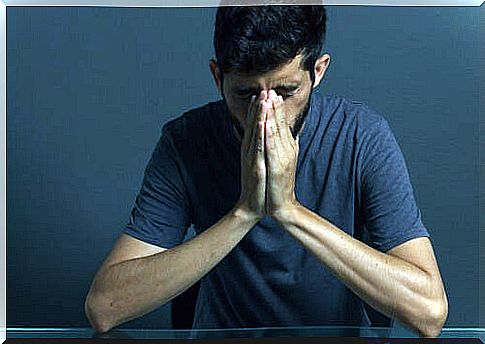What Is Hypothymia?

In recent times, misunderstood positivity has led us to somehow demonize negative feelings. For this reason, we are often alarmed when we feel sad, listless or down. Without a doubt, these emotions are as normal and healthy as any other, and we must allow ourselves to live them. Even so, it is possible that in some cases we are suffering from hypothymia.
The different mood disorders and their manifestations are similar and often overlap. Therefore, it can be difficult to distinguish which one we are facing or whether we are simply facing a natural decay. Hypothymia is little known and therefore confused or overlooked. So let’s see what it is and how to approach it.

What is hypothymia?
In the first place, it is necessary to clarify that hypothymia is only a symptom; that is, it does not constitute a psychological disorder although it may be present in several of them. It is a state of mind in which our emotional response is partially inhibited or inadequate in relation to the situation. That is, the person feels sad and dejected, but also is unable to experience happiness even if something good happens to him.
A person suffering from hypothymia will not feel the excitement, euphoria, or joy expected from receiving positive news, such as getting a raise, passing an opposition, or becoming a parent. Similarly, you may not react to situations that would arouse other types of emotions, such as compassion or gratitude. Usually, she will be cold and expressionless.
The following are the main manifestations of hypothymia:
- Sadness, dejection and absence of happiness.
- Decreased or inappropriate emotional expression.
- Hopelessness, pessimism and a feeling of failure.
- Slowness of movement and expressionless language.
- Loss of interest in activities that previously produced satisfaction (hobbies, friends, family …).
What should you know about it?
Hypothymia, as we have seen, differs from common sadness because it goes further quantitatively and qualitatively. In this sense, it is also important to learn to distinguish it from nosological entities, such as depression or dysthymia. It differs from them in these parameters:
- Duration. Symptoms must be present for at least six months continuously to diagnose depression. Similarly, in dysthymia the required criteria are two years. In the case of hypothymia, sadness or dejection can have a variable duration of days or months at the most.
- Intensity. Both dysthymia and depression have symptoms of greater intensity than hypothymia, especially depressive disorder.
- Other symptoms As we mentioned before, hypothymia is a symptom in itself, which is not accompanied by others nor does it form a diagnostic entity. On the other hand, dysthymia and depression include a whole picture of manifestations such as sleep and appetite disturbances, difficulty concentrating or suicidal ideation.

How to deal with hypothymia?
Although hypothymia is less serious than these mood disorders, it is important to act on it so that it does not end up leading to any of these. In general, in this case, the sadness is usually exogenous; that is, motivated by unfavorable external circumstances. Therefore, it is important that the person who suffers it has the support of both his environment and a qualified professional.
The main interventions will be aimed at the following areas:
- It is important that the person continues to carry out their normal daily activities and fulfill their obligations, despite the apathy they may feel.
- On the other hand, you need to get involved in experiences that are enjoyable for you. These do not have to be productive, it is enough that they provide you with some well-being or positive stimulation. Thus, any hobby, such as reading, dancing or playing video games can be of help.
- Social isolation should be avoided as this can aggravate symptoms. Thus, despite the reluctance that the person with hypothymia may feel, it is necessary that they continue to maintain social contact.
In short, if we present the manifestations of hypothymia we should not be alarmed, but it is recommended that we seek help. The support of our close circle and the development of coping skills can help us get out of this state.










